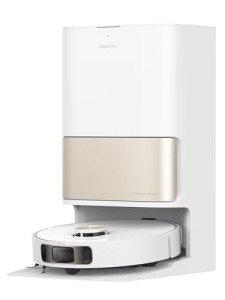How To Create An Awesome Instagram Video About Robot Vacuum Cleaner

The Rise of Robot Vacuum Cleaners in Industrial Settings
In the last few years, the landscape of industrial cleaning has experienced a significant transformation with the introduction of robot vacuum cleaners. These automated gadgets are not simply a novelty for homes; they have actually acquired traction in storage facilities, making plants, and other industrial environments. This short article explores the performance, benefits, and factors to consider of robot vacuum within the industrial context, while answering some often asked questions.
What are Robot Vacuum Cleaners?
Robot vacuum cleaners are automated cleaning gadgets geared up with advanced sensors and innovation that allow them to browse around spaces, discover dirt, and vacuum surfaces without direct human intervention. In industrial settings, they are created to manage a variety of debris types, help with regular cleaning schedules, and improve overall functional efficiency.
Table 1: Key Features of Industrial Robot Vacuum Cleaners
| Feature | Description |
|---|---|
| Navigation | Uses LiDAR or camera-based navigation for precise mapping. |
| Size and Design | Compact and robust style to fit in tight spaces and withstand tough environments. |
| Self-Charging | Immediately go back to its docking station for recharging. |
| Dustbin Capacity | Larger dustbin suited for industrial debris sizes and volumes. |
| Shows | Can be set for scheduling and specific cleaning tasks. |
| Information Collecting | Geared up with sensing units to gather data for upkeep and cleaning analysis. |
Advantages of Robot Vacuum Cleaners in Industrial Settings
The adoption of robot vacuum cleaners includes a myriad of benefits:
Increased Efficiency:
- 24/7 Operation: Unlike human cleaners, robots can operate around the clock, contributing to continuous tidiness without downtime.
- Time-Saving: Automated cleaning allows employees to concentrate on core jobs rather than cleaning tasks.
Cost Savings:
- Labor Costs: Maintaining a robot vacuum can reduce the need for a large cleaning personnel, lowering overall labor costs.
- Operational Efficiency: With improved cleanliness and reduced downtime due to upkeep problems, organizations can save money on operational costs.
Enhanced Safety:
- Reduced Risk: By lessening the human involvement in dangerous cleaning environments, the danger of mishaps is lessened.
- Consistent Cleaning: Robot vacuums make sure that locations are regularly cleaned, decreasing slip hazards and unhealthy environments.
Increased Flexibility:
- Customizable Cleaning Routes: These machines can be programmed to clean specific locations or floorings, adapting to changing industrial designs.
- Range of Surfaces: Industrial robot vacuums can manage various floor covering types, from concrete to tiles, making them versatile.
Environmental Impact:
- Sustainable Cleaning Solutions: Many designs utilize minimal water and eco-friendly cleaning services, helping in corporate sustainability efforts.
Table 2: Industrial Applications of Robot Vacuum Cleaners
| Market | Application |
|---|---|
| Production | Cleaning production lines and assembly areas. |
| Warehousing | Keeping clean and orderly storage spaces. |
| Food Processing | Making sure cleanliness in sensitive areas to meet hygiene standards. |
| Pharmaceuticals | Keeping ultra-clean environments for production. |
| Logistics and Distribution | Keeping pathways clear for efficient operation. |
Challenges and Considerations
While the benefits are substantial, companies must likewise consider numerous difficulties:
- Initial Investment: The upfront expenses of purchasing industrial robot vacuum cleaners can be considerable, though long-lasting savings might offset this cost.
- Repair and maintenance: Regular maintenance is necessary to keep the robotic systems operating optimally, and repair work can incur extra costs.
- Combination: Businesses may need to integrate these devices into existing workflows, which can require time and adjustment.
- Training and Support: Staff may require training to efficiently manage these makers, especially when troubleshooting or shows is needed.
Frequently Asked Questions About Robot Vacuum Cleaners in Industrial Settings
1. Just how much do industrial robot vacuum cleaners cost?
The cost can vary from a few thousand to 10s of countless dollars, depending upon specs, functions, and brand name.
2. What types of surface areas can they clean?
Robot vacuum cleaners are suitable for different surface areas consisting of carpets, tiles, concrete, and even some wooden floorings.
3. How do they browse intricate industrial environments?
Many industrial robot vacuums use sophisticated navigation systems like LiDAR, video cameras, and sensors to draw up and adjust to their environments for efficient cleaning.
4. Can they clean up large areas without human intervention?
Yes, industrial robot vacuums are created to tidy extensive locations with pre-programmed paths and schedules, efficiently operating autonomously.
5. Are these robots eco-friendly?
Numerous designs prioritize effectiveness and decrease water usage, making them a more ecologically friendly cleaning option compared to conventional techniques.
The intro of robot vacuum cleaners into industrial environments signifies a remarkable advancement in cleaning technology. With their ability to boost efficiency, lower labor costs, and preserve security, these automated systems are leading the way for smarter and cleaner industrial operations. While best robot vacuum deals may exist, the long-term benefits and technological developments are encouraging for markets seeking to improve their cleaning procedures. As innovation continues to progress, we can expect additional developments in robot vacuum that will transform industrial cleaning practices a lot more.

